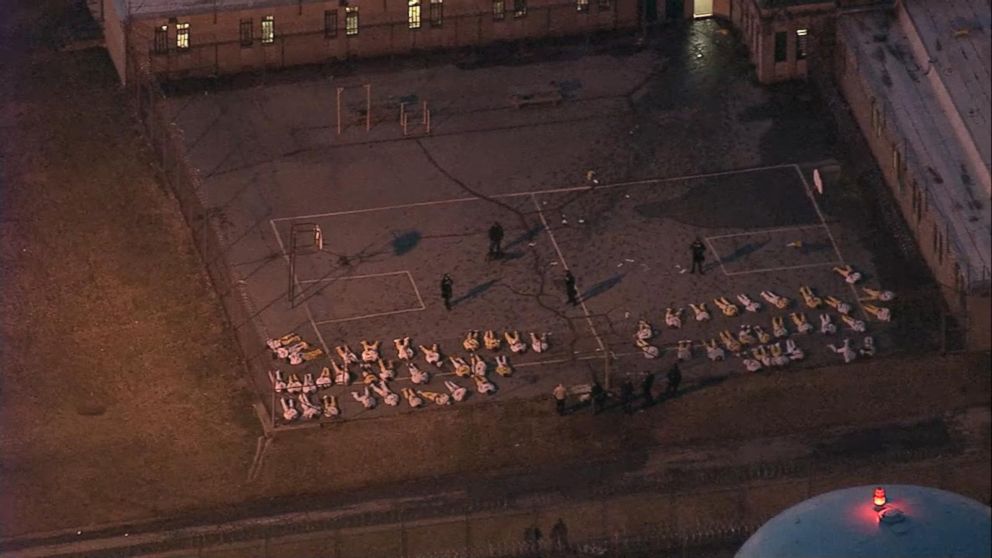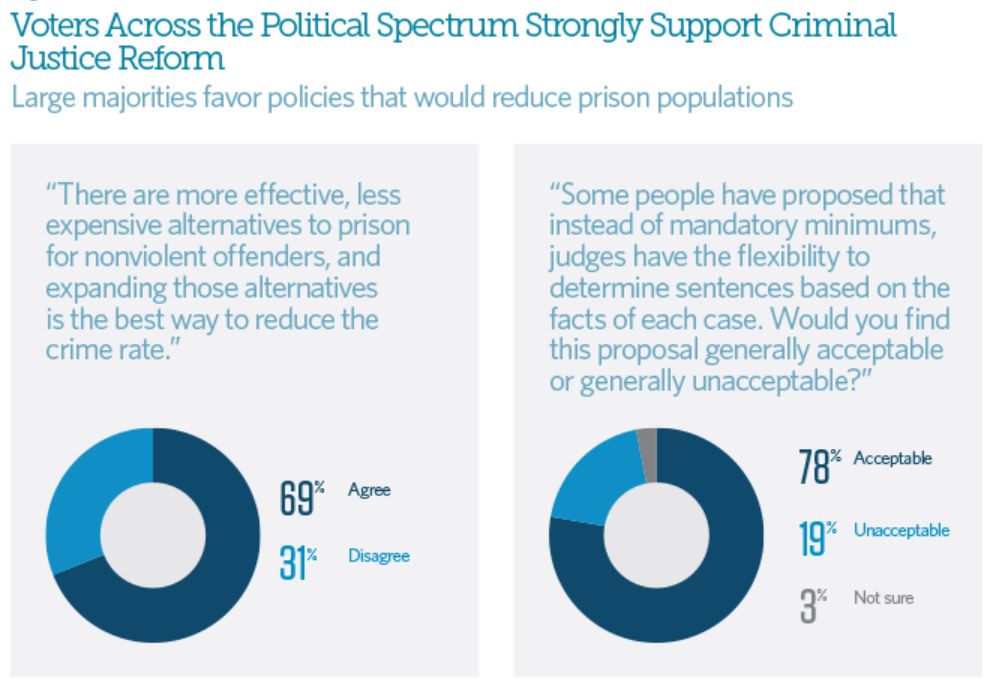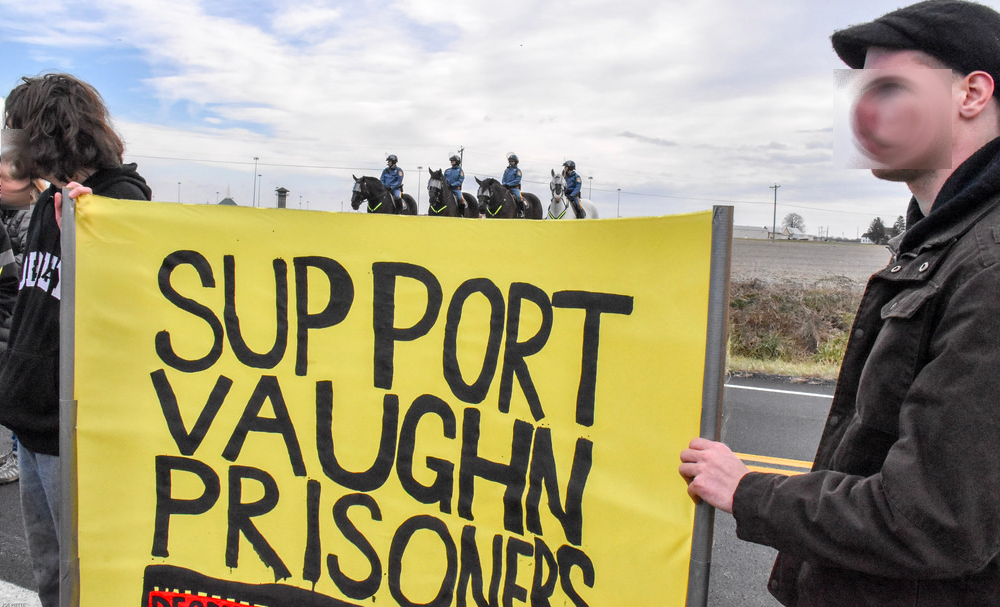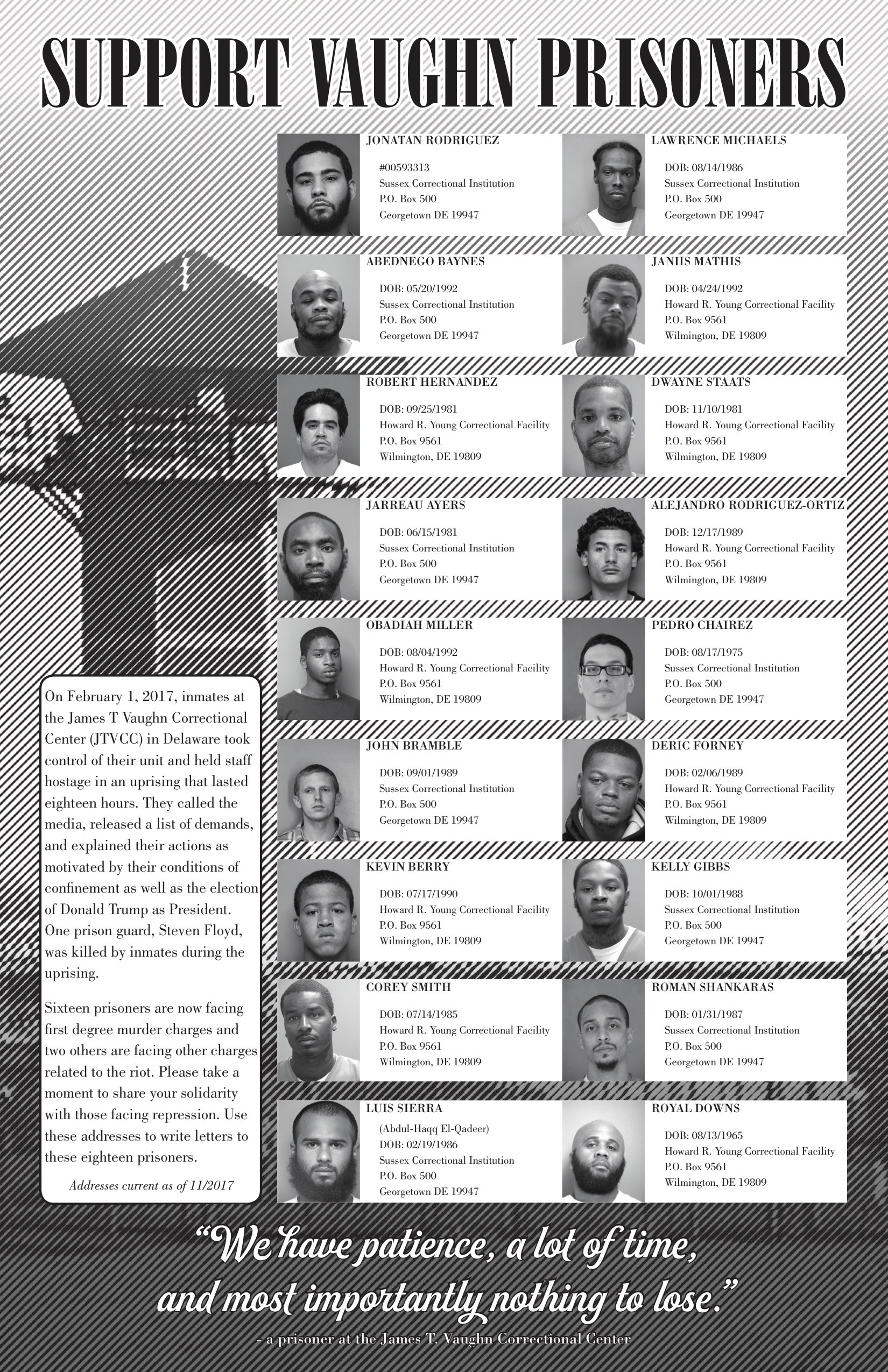An article from the It's Going Down column Bloc Party, discussing the significance of the Vaughn uprising and ways to build solidarity with prison rebels.
“We have patience, a lot of time, and most importantly, nothing to lose.”
-A prisoner at the James T. Vaughn Correctional Center
With the first trials for those arrested during the Trump inauguration on January 20th set to begin this week, we wanted to remind our readers of 18 others who fought the Trump regime from inside the walls of a Delaware state prison. On February 1st, 2017, inmates in the C-building at the James T. Vaughn Correctional Center (JTVCC) in Delaware took control of their unit and held staff hostage in an uprising that lasted over 18 hours. They called the media, released a list of demands, and explained their actions as motivated by their conditions of confinement as well as the election of Donald Trump as President. One prison guard, Steven Floyd, was killed by inmates during the uprising.
On February 1st, prisoners connected their daily struggles for humanity and survival to the broader political context we entered collectively as a nation. Much in the same way that hundreds of people took to the streets for deeply personal reasons on January 20th, using the inauguration of Trump as a way to highlight all those myriad reasons for resistance, the prisoners at Vaughn used the president and his policies as a means to highlight their own deeply personal struggles for liberation.
The uprising came after numerous nonviolent protests by prisoners had failed to lead to the prison addressing their grievances. In the aftermath of the uprising, corrections officers alleged that prisoners had been staging inmate-on-inmate fights in the prison yard to find vulnerabilities in the guards’ emergency response. On the day of the uprising, prisoners covered their faces with masks and rushed the two officers letting them back in from the prison yard—a key moment of vulnerability when the prisoner-to-guard ratio is at its lowest.

Prisoner surrender following a 18 hour uprising at the Vaughn Correctional Center in Delaware (Source: ABC News)
After more than eight months, on October 17th, an indictment was handed down by the Delaware Department of Justice that charged sixteen prisoners with murder charges for the death of a correctional officer. Those sixteen along with two other prisoners are also looking at counts of kidnapping, conspiracy and rioting.
As of this writing, six of these prisoners have pled “not guilty” and demanded jury trials. Of these six, five are charged with first degree murder. The court has also determined that the prisoners cannot be granted public defenders due to “conflicts of interest.” Instead they will be appointed private attorneys.
Death Penalty In Delaware
With the murder of the corrections officer at Vaughn during the uprising in February, there has been renewed support for the reinstatement of the death penalty in the State of Delaware, which had been ruled unconstitutional in August of 2016. The repeal of the death penalty was strongly opposed by the union representatives of both the police and corrections officers, who are currently using the death during the Vaughn uprising along with the death of a police officer in April, 2017 as a cry for a return to capital punishment in the state:
“There are some truly evil people who commit heinous crimes against innocent citizens in this state,” said Lt. Thomas Brackin, president of the Delaware State Troopers Association. “You do need to have the ultimate punishment for the ultimate crime.”
We’re reminded of the truly evil Delaware police officers who shot and killed Jeremy “Bam Bam” McDole, who was a wheelchair bound Black man murdered in 2015. The same police who are calling for “the ultimate punishment for the ultimate crime” all walked away without any indictments related to McDole’s death.
As recently as November 9th, 2017, prosecutors in Delaware have stated in court documents that they intend to seek the death penalty in this case if it is indeed reinstated. While the final state senate vote has yet to occur on this matter, it is important to keep a keen eye on this as it develops. It is also worth noting the way that the prison, police and prosecutors are collaborating to use what happened at Vaughn as a means of bringing a more totalitarian vision of so-called law and order to the state. Where there is resistance, like what we saw from within the walls at Vaughn, we can naturally expect repression to follow. In this case, repression could have deadly consequences.
Why We Support Prison Rebels
“The primary purpose of everything we do must be to make this society increasingly unmanageable. That’s key. The more unmanageable the society becomes, the more of its resources the state must expend in efforts to maintain order ‘at home.’ The more this is true, the less the state’s capacity to project itself outwardly, both geographically and temporally. Eventually, a point of stasis will be reached, and, in a system such as this one, anchored as it is in the notion of perpetual growth, this amounts to a sort of ‘Doomsday Scenario’ because, from there, things start moving in the other direction—’falling apart,’ as it were—and that creates the conditions of flux in which alternative social forms can really begin to take root and flourish.”
-Ward Churchill, The New Face of Liberation
Taken as a whole, prisoners across the U.S. right now are actively engaging in some of the most passionate, consistent and effective rebellion in the country. Month after month we read news of prisoners getting together to fight guards, attack the physical infrastructure that confines them, attempt escape, issue demands and make threats to back them up. They are actively linking up with each other and reaching out to those on the outside in search of accomplices. This is happening right now and it will continue to happen. The only question is whether we will be a part of it.
All of this comes as critiques of “mass incarceration” and “long-term segregation” are becoming increasingly mainstream. Even Oprah is against long-term segregation now. While these are reformist ideas in and of themselves, they point to the reality that everyday people are beginning to take note of what goes on behind prison walls in a new way. Each new season of Orange is the New Black has the dual effect of further exploiting prisoners for entertainment value and further humanizing the everyday lives of prisoners. And all this has the potential to shift the way society deals with crime and punishment.
This change is already beginning to take place. Both liberals and conservatives are coming to the conclusion that a system of mass incarceration isn’t sustainable and are beginning to chip away at it. According to the New York Times, 31 states “have already limited sentences; expanded alternatives to incarceration, such as drug treatment; or otherwise reduced the reach and cost of the criminal justice system.” At the federal level, there is bipartisan support for legislative action that would reduce mandatory minimum sentences and otherwise reduce the prison population. In 2016 we wrote about the Department of Justice’s announcement to end their contracts with private prison corporations for federal facilities, a part of their plan to reduce the federal prison population in the coming years.

(Source: The Pew Charitable Trusts)
Adding to this storm are the inevitable forces of reaction that are working hard to push society back toward more overtly brutal forms of punishment. Jeff Sessions’ “law and order” strategy as well as those seeking to reinstate the death penalty in Delaware are only contributing to the chaos of the current moment.
The incarceration system is further being destabilized by pandemic levels of overcrowding and understaffing in U.S. jails, prisons and detention centers. As of early November, the Delaware DOC “confirmed that the agency currently has 265 vacant correctional officer positions. [Correctional Officers Association of Delaware President] Klopp believes the real number to be much higher.” These conditions continue to exist ten months after one of the largest prison uprisings in the last few years, despite Delaware elected officials desperately scrambling to address these problems. Unfortunately for them, the only solution to this crisis is to convince the public to pump even more money into prison budgets, which they are increasingly reluctant to do.
None of this means that the world is about to get better. What it may mean, though, is that one system of control is weakening and those in power are being forced to consider how to replace it (their intention, likely, being to replace it with something more effectively repressive). But this moment of transition may be an opening in which a hard push could topple the already stumbling giant.
As the U.S. prison system finds itself on unsure footing, prisoners are doing an admirable job of shaking the ground it stands on. This is the key element that could create the “Doomsday Scenario,” Ward Churchill suggests. As David Fathi, Director of the National ACLU Prison Project, aptly pointed out during a press conference on the Vaughn uprising, “Prisons function with the consent of the prisoners. Staff will always be greatly outnumbered by prisoners.” Increasingly, prisoners across the country are withdrawing that consent. If these currents continue to deepen, the prison system in the U.S. could cease functioning.
How We Can Support Prison Rebels

Rally to support Vaughn prisoners on February 2, 2017. (Photo by Joe Piette)
The question, then, becomes how those on the outside can help prisoners bring about this collapse.
Here’s a few ideas we’d like to suggest:
Get together with others in your town and become experts about the prisons closest to you. Collaborate with others in your region to make sure that all the major prisons in your area are covered. Network with others doing the same work in other regions.
Get in touch with as many prisoners as possible in those prisons. Establish robust and overlapping networks of communication-meaning multiple people having complex relationships with as many prisoners as possible. Having multiple channels of communication ensures that in moments of rebellion, news will spread quickly and reliably and will be less likely to be shut down.
Focus on building relationships with prisoners who have demonstrated a willingness to act and to act collectively. Prison supporters are easily bogged down by requests from prisoners for help, with endless complaints, with requests that we be a dating service, etc. While helping prisoners is a big part of building and maintaining networks of communication, this is not a charity service. The goal in everything we do is to build our capacity to act together against prisons.
Build a common language and shared political and ethical foundation with prisoners in your region so that when shit goes down you know how to make decisions together quickly and fluidly. This also has the effect of inserting a political and ethical framework if prisoners are simply fighting back against conditions they hate but have not connected those struggles to a larger vision of society. Read zines and books together and discuss. Push back against racism, xenophobia, misogyny, homophobia, romaticization of violence, etc. Don’t expect prison rebels to be perfect. Don’t be afraid to say what you think, but don’t be afraid to listen and learn as well.
When an uprising does happen at a prison near you, act fast.
Gather outside the prison and hold banners, chant, play music and make lots of noise. This boosts rebelling prisoners’ morale and shows the guards and administration that people outside are paying attention.
Hold demonstrations at other locations in solidarity. These locations could be the DOC central office (usually in the state capitol), the warden or prison director’s home (as some prison abolitionists in Michigan recently did), at a location that profits off prisons, (such as McDonald’s), or really anywhere else. This has the effect of creating multiple zones of conflict, which has the potential of spreading the rebellion beyond its confines.
Talk to the media and explain the abuses by guards and staff and the conditions of confinement your group has documented at the prison. Without speaking for the prisoners if they haven’t asked you to do so, explain some reasons why prisoners rebel and situate the uprising in the context of a larger wave of prisoner rebellion.
Make your own media: write articles for independent news sources, make and hand out fliers, drop banners, wheatpaste posters and put up graffiti about the uprising.
Encourage others to call the prison in response to acts of repression by the prison. Attention from the outside has a powerful effect on the prison administration and can cause them to act less brutally toward prisoners. This has the dual effect of helping prisoners you care about and also increasing the chances that they will be willing to act again in the future because people had their back.
Track prisoners carefully, as they are often transferred in retaliation. Be sure to stay in touch with them. Help them spread word of the uprising in their new prison. Such trasnfers can have the affect of spreading rebellions throughout a prison system.
Help prisoners tell their stories of rebellion afterward and make sure they are heard far and wide.
This list is by no means exhaustive of course. There are countless ways one can support prisoners in their struggles and we trust you’ll come up with even more. The key is to simply start somewhere. The first place we see for supporting the rebels from Vaughn is by writing them and letting them know that we hear them loud and clear out here. In March a prisoner named Thomas Gordon wrote a letter of demands to the prison administration at Vaughn and opened his letter with this:
Due to the conditions of this prison and the treatment of those held within it, it was only a matter of time before we (as I stand in solidarity with them) were forced to take actions into our own hands. Our attempts at diplomacy were ignored, our pleas for help fell on deaf ears. There was no other way for you to know our struggle, for you to acknowledge our plight. What had to be done was done.
We created the poster below as a means of sharing these pleas and making sure they fell on listening ears. Even if you cannot take on the intensive work of supporting these prisoners long term, take a few moments and let them know that you heard them and we’re still listening.



Comments